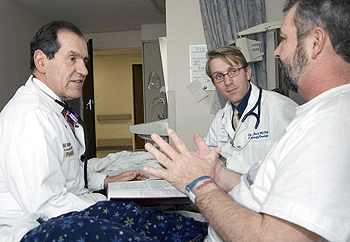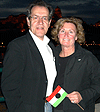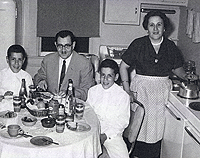In an era of super-specialized cancer care, Alex Denes, M.D., is earning great praise for his skills as a generalist. Denes, a medical oncologist for nearly 30 years, cares for all the hospitalized cancer patients at Siteman Cancer Center, regardless of their type of cancer. Breast, lung, colon, liver or any of the other myriad types of cancer – Denes treats them all with an expertise matched by few.

He was named director of the School of Medicine’s inpatient oncology service two years ago, and with the backing of John DiPersio, M.D., Ph.D., chief of the Division of Oncology, Denes has transformed the service into one that provides exceptional medical care to patients and serves as a model for other academic medical centers.
“The inpatient oncology service is large and diverse and requires the skills and efforts of a great general oncologist who has had significant experience managing a vast array of cancers,” DiPersio says. “That person also must be an excellent teacher and mentor to the residents and clinical fellows. Individuals like this are rare, and we are extremely lucky to have Dr. Denes. He has revolutionized the way we care for our inpatients, and as a seasoned oncologist, he is a guiding light to our residents and fellows.”
The patients Denes sees are often critically ill, either from their disease or complications related to treatment. At any one time, he manages the care of some 40 patients, and because they have different types of cancer and medical needs, it is unusual for any two patients to be on the same treatment regime.
“At times, its extremely challenging,” admits Denes, associate professor of medicine. “We focus on providing each patient with the best possible care for his or her disease.”
Before Denes took the helm, the structure of the inpatient oncology service was similar to those at other academic medical centers: Oncology faculty members took turns overseeing the care of hospitalized patients, typically for a two-week stint many times a year.
But there were shortcomings to this system.

“Doctors were overwhelmed by caring for hospitalized patients in addition to seeing their regular patients in the oncology clinic,” Denes explains. “The residents were unhappy because they didn’t know who to turn to for guidance, and the patients saw a different doctor each time they were admitted.”
DiPersio and Denes developed the current model one night over dinner as they brainstormed better ways to care for hospitalized patients. Denes is the full-time attending physician on the service, which means he is there all day (and often into the evening) Monday through Friday, making sure patients get the specialized care they need.
As a matter of routine, he and a resident see each new patient admitted to the service, and Denes holds daily conferences with all the residents to discuss patients admitted within the previous 24 hours.
The new model is a noticeable improvement.
“Patients are much happier because there is some continuity to their care both during their stay and when they return,” Denes says. “And more residents are now giving serious consideration to careers in oncology. They needed someone to serve as a role model, and they didn’t have that before.”
Word of the medical school’s new approach to inpatient oncology care has spread. Leaders from a number of other large academic medical centers have called or visited to understand how they might restructure their inpatient oncology services.
“Many are currently trying to move to our model — with our guidance and help — but most of them do not have a senior, highly skilled general oncologist like Alex Denes to serve as a teacher and a mentor, an advocate for patients and a leader for the service,” DiPersio says.
Escaping Soviet rule
Denes’ journey to Washington University began with his parents’ decision to flee their Hungarian homeland in 1956 after the failed revolution against Soviet-led communism.
Denes and his twin brother, Bela, were only 9, but their parents realized their sons would have limited opportunities under the country’s repressive communist rule.

Until the revolution, in which thousands of civilians were killed, the family had had a reasonably comfortable life. His father was a lawyer and then a judge in Budapest, and his mother, a homemaker.
But they were not Communist Party members, and after the Soviets quashed demands for political freedom, Denes’ parents made plans to flee, despite the danger and risk of arrest — or worse.
One day in early December, the family dressed in layers of their best clothing — being careful not to look suspicious — and boarded a train headed toward the Austrian border, as if they were going on a day-long excursion.
His parents left food out on the kitchen table, under the pretense they would be returning, and kept their plans secret, not even telling his father’s only sister, who lived nearby.
“We got off the train in a town in western Hungary, where my parents had friends who took us to their farm,” Denes says. “That night, they drove us closer to the border as we lay covered by hay in the back of a truck. We hid in a barn the next day and walked through the countryside during the night into Austria.
“I don’t remember all the details, but I do remember crossing into Austria and being welcomed with hot chocolate and chocolate bars. It was a cold winter day, and it tasted so good.”
Finding a role model
Denes’ three uncles had immigrated to Belleville, Ill., from Hungary soon after World War II, and the family quickly obtained immigration papers to join them.
|
Alex Denes Family: Married 37 years to wife, Mimi. Children: Christy, 32, a documentary film editor, and her husband Jean-Francois Soubiran; Alec, M.D., 30, orthopedic surgeon, and his wife Whitney Black, M.D.; Maggie, 24, entering medical school in the fall; Loren, 21, a WUSTL junior in the Japanese Language program in Arts & Sciences; grandson, Emile, 2. Hobbies: Reading books in Hungarian (“to maintain my language proficiency”), golfing, running and tinkering with old MG sports cars. |
When Denes and his family arrived, they did not speak a word of English. The uncles provided a lot of assistance to the family, and Denes’ parents worked hard to establish themselves. His father took a job in a laundry, and his mother worked as a housekeeper.
One of the uncles was a doctor and a role model to Denes and his brother. Both boys liked science and were good students, so careers in medicine seemed like a good choice. (Denes’ brother is a urologist in California.)
The brothers earned bachelor’s degrees from WUSTL, where they attended on full scholarships, and medical degrees from the University of Missouri.
After an internal medicine residency at The Johns Hopkins School of Medicine and two years in the Public Health Service with the U.S. Centers for Disease Control and Prevention, Denes returned to WUSTL in 1977 for a fellowship in hematology and oncology and later joined the faculty.
In 1985, he moved his practice to St. John’s Mercy Medical Center but continued to teach part time at the medical school, and in 1999, Denes rejoined the full-time faculty at the University and Siteman Cancer Center.
During his career, Denes has witnessed tremendous advances in cancer, including new chemotherapy drugs and treatment regimens, and the recent development of targeted cancer therapies.
However, more effective chemotherapy drugs do not displace the need for caring, hands-on doctors, and Denes is known as much for his warmth and compassion as for his expertise in oncology.
“Dr. Denes’ patient and comforting manner, his skill in explaining test results and treatment options and the time he spends with patients make all the difference,” says medical oncologist Steven Sorscher, M.D., assistant professor of medicine. “My colleagues and I value him for his tremendous knowledge of oncology, and we breathe easy knowing that while we are in clinic, he is in the hospital offering that same wonderful expertise and support to our patients.”
(From left) Alex Denes, M.D., and John Welch, M.D., Ph.D., a fellow in hematology/oncology, visit with patient Richard Wall at Barnes-Jewish Hospital. “Dr. Denes’ patient and comforting manner, his skill in explaining test results and treatment options and the time he spends with patients make all the difference,” says colleague Steven Sorscher, M.D.